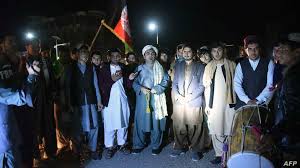US and Afghan Taliban start partial truce

It is understood that no major offensive operations will be launched during the partial truce
A seven-day “reduction in violence” between the US and the Afghan Taliban has begun, officials say.”This is an important step on a long road to peace,” US Secretary of State Mike Pompeo said on Friday
If successful, the two sides will then sign the first phase of a deal aimed at ending nearly two decades of conflict.The agreement, which began at midnight local time, comes after more than a year of talks between American and Afghan Taliban representatives.
In a statement, Taliban negotiators said “a suitable security situation” would be created ahead of signing a deal they hoped would “lay the groundwork for peace across the country with the withdrawal of all foreign forces”.
Nato Secretary General Jens Stoltenberg welcomed the move, adding that this was “a critical test of the Taliban’s willingness and ability to reduce violence, and contribute to peace in good faith”.
The Afghan government, which is currently grappling with a dispute over the results of the country’s presidential elections, was not part of the negotiations.Under the terms of the partial week-long truce, it is understood that no major offensive operations will be launched against the Taliban, Afghan or international forces.
“We have come to an understanding with the Taliban on a significant reduction in violence across Afghanistan,” Mr Pompeo said in a statement.”Upon a successful implementation of this understanding, signing of the US-Taliban [peace] agreement is expected to move forward. We are preparing for the signing to take place on 29 February,” the statement added.
The US has spent billions of dollars since 2001 fighting the Taliban insurgency in Afghanistan.
President Donald Trump, who pledged during his 2016 presidential campaign that he would end the US war in Afghanistan, has been pushing for the withdrawal of US troops from the country.The move is seen as an opportunity for the Taliban’s leadership to show they can control their fighters on the ground.
It could also pave the way for talks between Taliban negotiators and Afghan politicians, our correspondent adds.In December 2018, the Taliban announced they would meet US officials to try to find a “roadmap to peace”.But the militants continued to refuse to hold official talks with the Afghan government, whom they dismissed as American “puppets”.
Washington’s top negotiator announced in September that the US would withdraw 5,400 troops from Afghanistan within 20 weeks as part of a deal agreed “in principle” with Taliban militants.But days later, Mr Trump said the talks were “dead”, after the militant group admitted to killing a US soldier.
In the months since the deal collapsed, there has so far been no let-up in fighting. The Taliban has warned that the US would “lose the most” by cancelling the talks.Since 2011, Qatar has hosted Taliban leaders who have moved there to discuss peace in Afghanistan.
It has been a difficult process. A Taliban office was opened in 2013, but closed the same year amid rows over flags. Other attempts at talks have stalled.Qatar was also the host of a major conference in July that agreed a roadmap for Afghan peace. Significantly it included both the Taliban and Afghan government officials, though the latter attended in a “personal capacity”.
It began when the US launched air strikes one month following the 11 September 2001 attacks and after the Taliban had refused to hand over the man behind them, Osama Bin Laden.The US was joined by an international coalition and the Taliban were quickly removed from power. However, they later emerged as an insurgent force and continued deadly attacks, destabilising subsequent Afghan governments.
The international coalition ended its combat mission in 2014, staying only to train Afghan forces. But the US continued its own, scaled-back combat operation, including air strikes. Media captionTens of thousands of Afghan soldiers have been killed and injured. This is their story
The Taliban has, however, continued to gain momentum – in 2018, the BBC found that Taliban militants were active across 70% of Afghanistan.Nearly 3,500 members of the international coalition forces have died in Afghanistan since the 2001 invasion, more than 2,300 of them American.
The figures for Afghan civilians, militants and government forces are more difficult to quantify. In a February 2019 report, the UN said that more than 32,000 civilians had died.The Watson Institute at Brown University says 58,000 security personnel and 42,000 opposition combatants have been killed.
The Taliban, or “students” in the Pashto language, emerged in the chaos that followed the withdrawal of Soviet troops in 1989.They took Kabul in 1996 and were in charge of most of the country within two years, practising their own austere version of Sharia, or Islamic law.
Before being removed from power they banned TV, music and cinema, enforced strict dress codes, severely curtailed female education.
Mullah Omar continued to lead the Taliban after they were ousted. He died in 2013 although the Taliban did not confirm it for two years.The Taliban are now led by Mawlawi Hibatullah Akhundzada.





